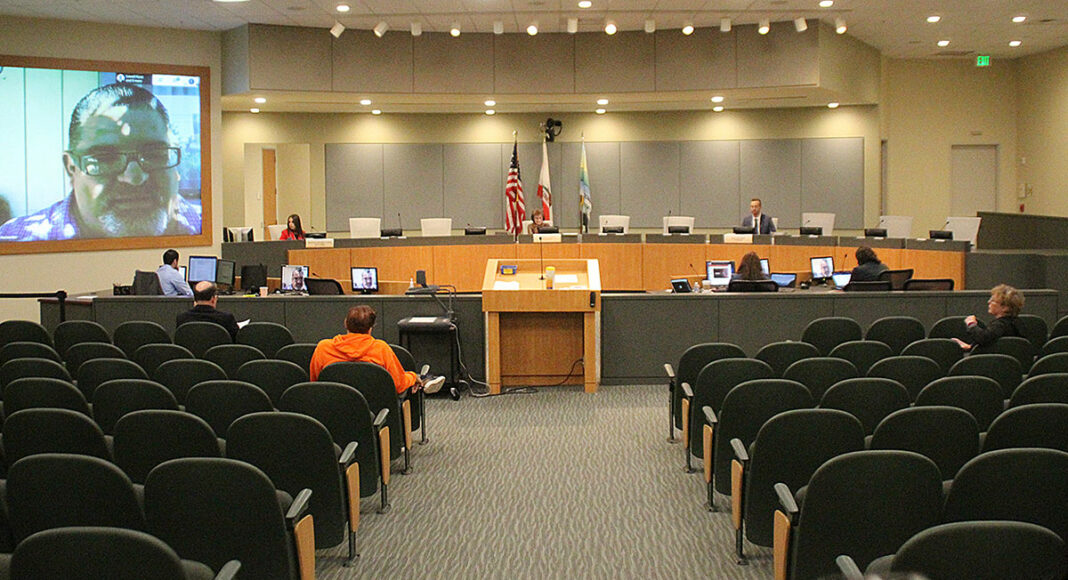By Tony Nuñez and Todd Guild
After more than a year of meetings held remotely under Covid-19 restrictions, the Pajaro Valley Unified School District Board of Trustees plans to resume in-person meetings on June 9, the district confirmed.
“We recognize that public meetings are a vital part of representative government,” Board President Jennifer Holm said. “In-person meetings allow clarity of communication and an opportunity to have real-time interactions with those we represent.”
The board is among several public boards and city councils that are eagerly anticipating a return to in-person meetings after attending virtual sessions often plagued by “hot mic” moments and technical difficulties.
But when exactly other local boards and councils will return to their traditional meeting venues and how those meetings will look and be conducted is still to be determined.
The Ralph M. Brown Act, among other things, requires officials of public boards and members of the public to be physically present to participate in a meeting. But as the novel coronavirus swept through the nation last year and stay-at-home orders went into effect, California Gov. Gavin Newsom waived that requirement with an executive order that is expected to remain in place until the governor rescinds his state of emergency declaration.
Several bills weaving their way through the state legislature could force some elements of the pandemic-induced virtual meetings to stick around, even after officials return to their spot behind the dais.
Perhaps the most well known bill of the bunch is Assembly Bill 339. That bill, introduced by Assembly Members Alex Lee and Cristina Garcia, would require public boards to provide virtual access, even if all board members attend in-person. Local Assemblyman Robert Rivas, whose 30th District represents Watsonville, South Santa Clara County and much of the Salinas Valley, is listed as a coauthor of the bill.
Though dozens of organizations were in support of the bill’s expansion of virtual attendance, the League of California Cities, an association that represents the state’s 482 cities, as well as the Community College League of California, the Association of California School Administrators and the California State Association of Counties wrote in a letter of opposition last month that several of the bill’s provisions would have handed down costs to local jurisdictions already struggling financially because of the pandemic.
AB 339, as most bills typically do, has since seen multiple major revisions that sought to ease those concerns, including the removal of various translation services.
As it stands now, the bill, if approved, would only be in effect until Dec. 31, 2023, and it would only apply to city councils and supervisor boards representing 250,000 residents or more.
In Santa Cruz County, that bill would only apply to the County Board of Supervisors.
Santa Cruz County spokesman Jason Hoppin said that the board has not yet set a date to allow public meetings to resume, but that it is likely they will return in August. It is still too early to determine what, if any, virtual meeting aspects they will have to incorporate into their meetings when they return to their chambers on Ocean Street, Hoppin said.
“Until then, it’s going to be up to the board to determine how they want to move forward,” he said.
For smaller public boards, the decision of whether to carry over elements of virtual meetings will likely be up to elected officials.
If approved as it stands today, Assembly Bill 703, introduced by Assemblywoman Blanca Rubio, would allow boards to offer their leaders and constituents a teleconferencing option—but it would not be a requirement.
The Santa Cruz City Council and the Santa Cruz County Office of Education Board of Trustees have no set date for resuming in-person meetings but will likely discuss it at future meetings, spokespeople from those bodies said.
Watsonville City Manager Matt Huffaker said that staff will ask the City Council for direction for their meeting structure, among other things, during a session in July.
Watsonville Mayor Jimmy Dutra says that the City Council could explore a hybrid option for its meetings when it returns for in-person sessions, which are tentatively scheduled to resume in August after a summer recess.
Dutra says the City Council Chambers in the Civic Plaza will need an “expensive” technological retrofit to smoothly conduct hybrid meetings. The City Council conducted two such meetings during the pandemic, and Dutra—then a member of the public—remembers the first was marred by numerous technical difficulties. The second ran a little smoother, but still required Assistant City Manager Tamara Vides to run around the chambers with her cell phone so that City Council members could hear and speak to each other.
“It’s going to be hard because we’ve never done this before,” he said.
Dutra said that he is longing to return to the City Council Chambers after spending his first five months as mayor behind a screen. Technical difficulties have bogged down the pace of City Council meetings, he said, including one instance in which they had to conduct a “hard reset” because of a faulty link.
Dutra added that virtual meetings have lessened the impact of the proclamations and awards presented to local businesses and community members sought to honor their accomplishments and services.
“The conversations and the meetings are just different when you’re face to face with your fellow council members,” he said. “It’s going to be exciting to be back in there and see the community again.”











